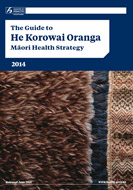Published online:
20 June 2014

Summary
He Korowai Oranga: Māori Health Strategy was created to guide the Government and the health and disability system to achieve the best outcomes for Māori. It has now been enhanced through Pae Tū: Hauora Māori Strategy.
This guide will help you to navigate the strategy and provides a description of its various elements – including its overarching aim: Pae Ora – Healthy futures for Māori.
